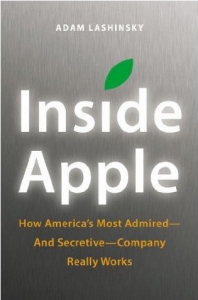In trecut Apple a avut foarte multe de pierdut de pe urma masurilor lejere de securitate, compania ajungand chiar in pragul falimentului inainte ca Steve Jobs sa revina in functia de CEO si sa schimbe din temelie tot ce tine de securitatea produselor companiei. In cartea Inside Apple: How America’s Most Admired and Secretive Company Really Works avem prezentate cateva informatii extrem de interesante in legatura cu modul in care functioneaza compania Apple si citind extrasele de mai jos veti realiza ca Apple este organizata ca o agentie secreta sau poate chiar mai rau.
Apple employees know something big is afoot when the carpenters appear in their office building. New walls are quickly erected. Doors are added and new security protocols put into place. Windows that once were transparent are now frosted. Other rooms have no windows at all. They are called lockdown rooms: No information goes in or out without a reason. People working on launch events will be given watermarked paper copies of a booklet called Rules of the Road that details every milestone leading up to launch day. In the booklet is a legal statement whose message is clear: If this copy ends up in the wrong hands, the responsible party will be fired.
La Apple fiecare angajat are un rol bine precizat in cadrul companiei si informatiile pe care le primeste sunt cele absolut necesare pentru ca el sa isi indeplineasca indatoririle de serviciu. In general un proiect pentru lansarea unui produs nou este imediat descoperit de angajati atunci cand camere noi se construiesc in campusul companiei si cand anumite zone devin restrictionate desi anterior erau accesibile oricui. Apple ia masuri de securitate exceptionale atunci cand pregateste lansarea unui nou produs si daca un angajat nu a fost informat in legatura cu ce se intampla atunci cu siguranta nu trebuie sa stie nimic. Cei care totusi afla cate ceva trebuie sa semneze documente prin care sunt de acord sa pastreze informatiile confidentiale altfel risca sa fie concediati si actionati in instanta.
Quite likely you have no idea what is going on, and it’s not like you’re going to ask. If it hasn’t been disclosed to you, then it’s literally none of your business. What’s more, your badge, which got you into particular areas before the new construction, no longer works in those places. All you can surmise is that a new, highly secretive project is under way, and you are not in the know. End of story.
Acelasi lucru este valabil si pentru cei din conducerea companiei deoarece orice discutii avute intr-o sedinta trebuie pastrate secrete fata de oricine altfel concedirerea este masura care va fi aplicata si impreuna cu ea avocatii vor cauta metode de actionare in instanta. Interesant este ca membrii conduceri companiei Apple pun foarte mare pret pe buzz-ul generat inaintea unei lansari considerand ca el poate valora milioane de dolari daca este concentrat corect insa chiar si asa nimeni nu are voie sa “sufle” ceva la presa.
For new recruits, keeping secrets begins even before they learn which building they’ll be working in. Many employees are hired into so‑called dummy positions, roles that aren’t explained in detail until after they join the company. “They wouldn’t tell me what it was,” remembered a former engineer who had been a graduate student before joining Apple. “I knew it was related to the iPod, but not what the job was.” Others do know but won’t say, a realization that hits the newbies on their first day of work at new-employee orientation. ”You sit down, and you start with the usual roundtable of who is doing what,” recalled Bob Borchers, a product marketing executive in the early days of the iPhone. “And half the folks can’t tell you what they’re doing, because it’s a secret project that they’ve gotten hired for.”
Apple a pierdut foarte multe din cauza informatiilor “scapate” catre presa insa acum sistemul de securitate conceput de Steve Jobs are menirea de a tine orice secret, in cadrul companiei, in orice conditii.






















